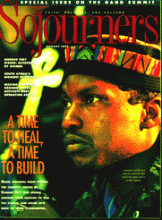Marion Stamps was the chair of the Tranquility-Marksman Community Organization in the Cabrini-Green housing project in Chicago, where she lived for over 31 years, when this interview appeared. Jim Wallis spoke with her after the 1993 Gang Summit. - The Editors
Jim Wallis: What do you think was the significance of the summit?
Marion Stamps: The summit signified reunification of the black poor and oppressed communities, and it came from the bottom up instead of top down. If we are to unite our communities and stop the violence, it has to take place from the bottom up. Certainly the people at the summit represent the very fabric of the grassroots community.
It was very significant for the brothers to work out for themselves some of the problems they have created for the community. I think they are the only ones who have the solution.
I got a real good feeling from this summit. Having come from the old school, I'm clear that unity only comes out of struggle. When you're able to struggle on issues with brothers and sisters and come out unified, then you have the foundation you need to build a strong and lasting relationship.
Wallis: Can you comment on the role of women in the summit and how that came about?
Stamps: It was very clear from the onset there had not been any participation in leadership from sisters. There were no sisters sitting at the head of the table, there were no statements coming from sisters, there was no introduction of sisters participating in the summit. This is typical in any organization nowadays unless it is a women's organization.
Read the Full Article

